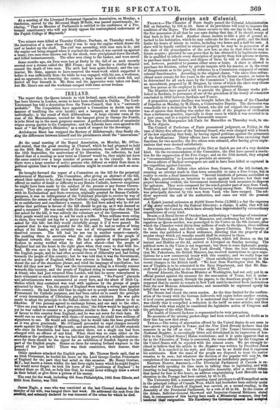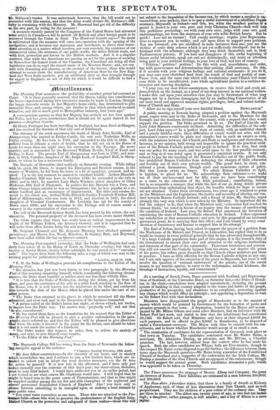.Foreign anti Colonial. Firawcir..—The Chamber of Peers finally passed the
Colonial Administratioa Bill on Saturday, by 103 to 59. Soine of its provisions will tend to improve the condition of the Negro. The first clause secures to him one day in the week, and the free possession of all that he can earn dating that day, if he should accept of that boon in lien of food. Another clause insures to him a plot of ground at- tached to his habitation, which he may cultivate for his own profit; and the third limits his hours of labour to twelve, including two hours and a half for rest. A slave will be legally entitled to whatever property he may be in possession of at the date of the promulgation of the new law, as also to that which he may in future acquire; provided he can prove that he has obtained it by legitimate means. He is qualified to inherit every description of property from free persons or slaves, to purchase lands and houses, and dispose of them by will or otherwise. He is not however' permitted to possess either arms or boats. A slave is allowed to purchase his freedom, either by private bargain with his master, or in the event of disagreement as to the price, by reference to a Commission composed of certain colonial functionaries. According to the original clause, "the slave thus enfran- chised must remain for five years in the service of his former master, on terms to be determined for all such cases by the Commission "; but the Chamber adopted an amendment, proposed by M. Bengnot, by virtue of which the slave may choose any free person as his employer in this five-years apprenticeship.
The Deputies have passed a bill to prevent the piracy of literary works pub- fished in Sardinia, in pursuance of one of the provisions of the treaty of commerce concluded in 1843 between Sardinia and France.
A proposition against duelling was brought before the Bureau of the Chamber of Deputies on Monday, by M.Dozon, a Conservative Deputy. The discussion was remarkable for a declaration by M. Gaizot, who did not support the measure: he was of opinion that duelling was rather the result of the progress of civilization than a barbarous practice, especially in those cases in which it was resorted to in a just cause, and in a regular and honourable manner.
The Due De Montpensier left Paris for Marseilles on Thursday week, to em- bark for Algeria.
The Council of Prefecture of Paris pronounced judgment, on Friday, in the case of thirty-five officers of the National Guard, who were charged with a breach of the law regulating that body, by having signed petitions against the armament of the fortifications. Thirty officers have been suspended from exercising their functions for two months; the five others were released, after having given expla- nations that were deemed satisfactory.
SwarzsmAnti.—The accounts of the Diet at Zurich are not of a very decisive kind. On the recommendation of the Committee, the Diet have passed a resolu- tion for the suppression of the Free Corps; and on the llth instant, they adopted a " recommendation " to Lucerne to proclaim an amnesty. Seven editors of Radical newspapers are said to have been killed or captured Is the expedition against Lucerne.
The Journal des Dibats cites adviees from Geneva, of the 5th instant, re- counting an attempt made in that town ostensibly to raise a Free Corps, but ia reality to excite a local insurrection. "Several hundreds of persons assembled on the Paquis, proclaiming an intention to march against Lucerne; but their real project becoming evident, the Government immediately took measures to disperse the agitators. They were composed for the much greater part of men from Vaud, Neufchatel, and Germany; very few Genevese being among them. The movement was principally directed by two men from Vaud, who have escaped. The sol- diery. answered the call of the authorities, and came out with the greatest alacrity." A Zurich journal estimates at 40,000 Byres Swiss (2,3001.) a day the expenses of tl4rmy embodied by the Federal Directory; a charge, it adds, that will fall heavily upon the Cantons, which have already been impoverished by extraordinary expenditures of every kind. Sisane.—A Royal decree of October last, authorizing a "marriage of conscience' between Christina and the Duke of Rianzares, and confirming her titles and pre- rwatives as Queen-mother, was promulged in the Corte.s on the 8th instant; after which the Chamber voted thirty-four millions of reels to the Queen three millions to the Infanta Luisa, and three millions to Queen Christina. The Gazette of the same day published a Royal onlinance, directing that the property of the secular clergy which yet remains unsold shall be restored to them. UNITED bursa—The mail-steamer Cambria, which left Boston on the lit instant and Halifax on the 3d, arrived at Liverpool on Sunday morning. The political news in the Union is not important; but there is some diplomatic gossip. "It is now certain," says the New York Heraidt "from the best information, that Mr. Pakenham, the British Minister, has received instructions to open nego- tiations for a new commercial treaty with this country; and we really hope our Government may meet him half-way." Great satisfaction was expressed at the recent changes in the British tariff. "We hear from Washington that Mr. Ma- son of Virginia is to be reinstated in the Navy Department, and that Mr. Ban- croft will go to England as the successor of Mr. Everett."
General Almonte, the Mexican Minister at Washington, had not only put in an official protest against the measure for the annexation of Texas, but is under- stood to intend RR appeal, through the papers, to the American people! It is now supposed that he meant to remain in New York until he received fresh instructions from the new Mexican Administration; and meanwhile he expressed openly his belief that war will ensue.
The Senate bad closed the extra session. As the time limited for the confirm- ation of the treaty with the German Zollverein will expire before another session, it is of coarse permanently lost. • It is understood that the cause of the rejection was chiefly that it compelled a reduction in the tariff on some articles, and thus interfered with what might be considered the legislative action of Congress ardl the privileges of the other House. The health of General Jackson is represented to be very precarious.
No accounts of the missing packet-ships had been received, and rill doubt as to their fate has now died away. Taus.—The terms of annexation offered by the United States do not seem to have grown very popular in Texas; and the New York Herald declares that the measure is as far off as ever. "The organ of [the Texan] Government, the National Register, is exceedingly bitter and determined in its expression of hoe- tility to the [United States] Bonze resolutions; and it is quite apparent that 130 far as the Executive of Texas is concerned, the terms offered by the Congress of the United States will be rejected with the utmost scorn. We are strongly in- clined to believe that the article in the Register was written by President Jones himself. It is couched in his style, and there can be no doubt that it expresses his sentiments. How the mass of the people are disposed to treat the matter remains to be seen; but whatever the decision of the popular will may be, tbs completion of the measure may be now regarded as indefinitely postponed." Barman NORTH Asismcw.—The Provincial Parliament of Canada is re- proached with spending its time more in talking than in legislating, and with resorting to bad language. In the Legislative Assembly, after a stormy debate that lasted for four or five hours an address congratulating Lord Metcalfe on his elevation to the Peerage had Weir carried, by 4.5 to 25. The University Bill, a measure granting equal privileges to all Evangelical meta in the principal college of Canada West, which had heretofore been entirely under the control of the Church of England, was carried, on a second reading, in the Assembly of the Provincial Parliament, by a vote of 45 to 34. In the course of the debate, Solicitor-General Sherwood and Inspector-General Robinson stated that, in consequence of this having been made a Ministerial measure they had tendered their resignation. His Eaalleney the Goyerhar-Cieheral liaa accepted Mr. Robinson's tender. It was understood, however, that the bill would not be proceeded with this session, and that the delay would obviate Mr. Robinson's diffi- culty in remaining with the Ministry. Mr. Sherwood had got rid of the difficulty On his own part, by voting for the measure !
A measure recently passed by the Congress of the United States had attracted
some notice in C bill to permit all British and other foreign goods to be conveyed through the Union in bond. The Montreal Gazette says—"No doubt is entertained that the measure will come into operation with the opening of the navigation; and it becomes our statesmen and merchants to direct their imme- diate attention to a matter which involves, not very remotely, the existence of our commercial cities, the revenues of our public works, the direct British trade, and with that, protection and favour in the British markets. And it is a singular contrast, that while the Ainericans are passing an act for the purpose of securing to themselves the transit trade of the Canadas, the Canadians are doing all that legislation can do to repel the transit trade of the Western States; and, not con -tent with thwarting and abusing, as the enemies of the farmer, those who would attempt to secure them the manufacturing of American flour for the New Eng- land and West India markets, put an additional duty on that brought through for export to England; an act of folly for which it would be difficult to find- a paralleL"



























 Previous page
Previous page